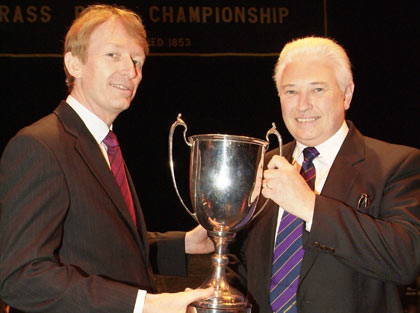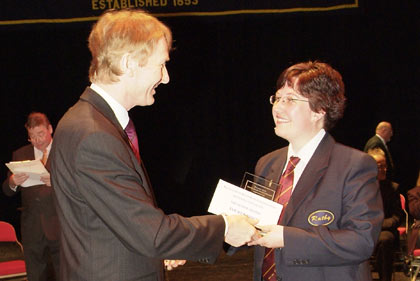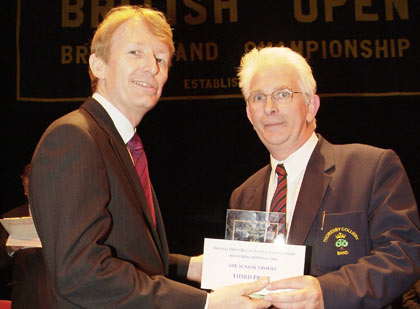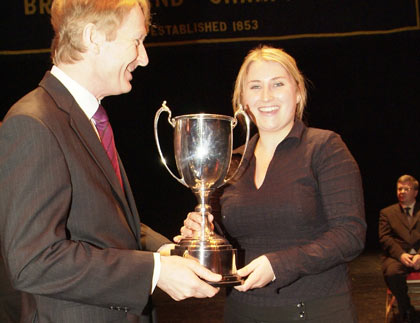2006 Spring Festival - Senior Trophy retrospective
17-May-2006A Scottish composer, a Scottish winner, a Scottish judge and even their National football team ended up winning a cup on the weekend. It seems things are looking up north of the border, and Rob Richardson was on hand to witness it all.
It is a common grumble amongst bandsmen and women that the contests which make up the Spring Brass Band Festival are amongst the most difficult to qualify from.
Unlike most band contests there are often no ‘clear-cut' favourites due to a much more even playing field than would be normally found in a typical event, with half of the bands on any given day more than capable of taking the title and qualifying for the next level of the competition or the British Open itself. The reputation of these contests being somewhat of a ‘lottery' was certainly confirmed at the results of Saturday's Senior Cup contest.

Senior Service: Kingdom Brass receive the Senior Cup from Martin Mortimer
The Senior Cup represents the third ‘tier' of the qualification process that culminates with the British Open. The first four bands from this section are invited to compete in the Senior Cup the following year, from which they can qualify for the Grand Shield and finally a shot at the ‘Promised Land' in Symphony Hall. Many of the country's best bands have secured their place in the Open this way in the past few years, with Cory, YBS, Kirkintilloch and CWS Glasgow all on the Grand Shield Honours list.
The bands gathered to tackle Peter Graham's ‘The Essence of Time'; a piece which was originally used as the set test at the 1990 European Championships. Having become rather accustomed to continuous complaints about the suitability of test pieces selected for contests, one of the most pleasing things about the Senior Trophy was that the piece seemed to suit everyone: players, observers and the day's adjudicators James Gourlay and Malcolm Brownbill.
It was certainly a test for all the bands though, none of which emerged unscathed on the day, but several of whom gave performances which adjudicator James Gourlay, when speaking to 4BR after the result, described as ‘a perfect balance between musical quality and technical assuredness.'
He also said they were looking for bands who created the right mood in the various sections (‘mini movements' as he put it) of the piece. James praised the choice of test piece and indicated that both he and Malcolm Brownbill had been able to find something new in every band's performance. His remarks to the audience in the Opera House prior to the announcement of the results were witty without being prescient. "We will be popular with one band, whilst the other 19 will think they were robbed," he said. Cue a few raised eyebrows, especially as he had made the equally humorous point of thanking the Scottish composer of the piece for such a fine work. Would that mean a Scottish winner then? That would be a coincidence you could hear minds thinking.
That may be the case, but James' final choice for the top prize did not seem to correlate with many seasoned observers would have chosen. Tat said, James is a wonderful musician who has strong ideas and thoughts on what he likes to hear from a brass band. We may not have agreed with his decision, but you have to take your hat off to him and Malcolm Brownbill for that matter for sticking to their guns. More judges like these we need in the movement.
It must be said that ‘The Essence of Time' was a cracking choice of test piece for the contest. Lots of tight ensemble work, testing solo passages, loud heroic stuff and also parts which demanded that small touch of musical sensitivity to really make them shine are all facets of the piece. It is still a very demanding work to overcome successfully.
The worrying thing about the day was that although no band gave what could be described as a bad performance, not many gave readings of the work that could have been described as musically satisfying either.
Several moments in the piece proved to be the undoing of the bands, both in a musical sense and also due to basic technicalities either not being observed or played in a style which was in any way appropriate to this particular work. The texture and flow of the music is such that if tempos are even slightly too fast or too slow, the sections which precede and follow them lose any sense of meaning and purpose. Even if some of the piece's technical demands cannot be met, every conductor should have been able to make at least some parts of the piece shine with musicality. In the end, the adjudicators said they went for a balance between technique and music, but it must be said that there was not much of the latter on display on Saturday.
The day kicked off with Haydock, who under conductor Edward Kennedy gave a performance which was never going to get them into the prizes, but nevertheless contained come great moments with an excellent horn section in particular standing out throughout the entire performance.
The odd wavers in ensemble just spoilt the flow of the music in places, but the MD created some lovely shapes and their soprano player was one of the only ones of the day to attempt and nail the (optional!) top D at the end. The band should not be too disappointed with 15th place as they could have come higher, but the partnership between Edward and the band is obviously one which is working. They will though be relegated from the contest for next year. A touch unluckily for us.
Next up were Parc and Dare, and after their performance it was clear that we were not going to be treated to twenty similar performances of the test piece. Parc and Dare's approach was much more ‘in your face,' which at some points was very exciting to listen to, and at others was simply too harsh for this particular acoustic. The euphonium and baritones excelled at the Alla Marcia section, but their performance could have done with a little more space during the lyrical passages and less harshness in the faster sections, although at points it was exciting stuff.
After a slightly unconvincing first couple of bars, Hatfield under Graeme O'Connor recovered to give a reading which was sympathetically played right up until the final theme section. It just got a little uncertain thereafter where musically the picture was lost with the tempo being far too fast in places. Detailed playing was a feature of this performance though, with some excellent solo work, especially from horn and euphonium.
United Co-op Yorkshire Brass will maybe wish that they could go on stage and perform again, as they never seemed to really get going at any point in the piece. There were some lovely moments, and the trombones performed with great panache, but in general it was spoilt by almost inaudible cornet and baritone soloists and overall tiredness towards the end (although the bumper-up cornet made a nice job of the lovely cornet solo. Lots for the band to work on though, and as with many other bands on the day, they could have played much more to their potential.
Even during the opening bars of the piece, Marsden's performance felt like a breath of fresh air from the word go. This was one of the only interpretations of the piece that held the attention of the listener from the very start, with the space that is so crucial in this piece being given to all the solo lines and wonderful moments of restraint creating a sense of serenity which then made the faster sections seem more driven and purposeful.
All the band's soloists were on top form, augmented throughout by the sterling soprano playing of Andrew Lofthouse, who will surely be one of the leading soprano players of the next generation.. A few slight lapses in ensemble and tuning could have possibly left the door open, but the ninth place given to the band in the final result must have been a real disappointment – 4BR had them a very, very close second.
The eventual winners of the day, Kingdom Brass, followed Marsden on stage. Led by Craig Anderson, they produced a performance which contained many moments of great poise and clarity, with both cornet and euphonium soloists shining in the tricky solo passages.
Their ending to the piece was expertly crafted, giving a great sense of satisfaction at the conclusion. However, throughout the other sections of the piece more could have been made of the music, with some choices of tempo being a little too stable to give the music a real sense of pulse. Even if a band play neatly and with a low error-count, as Kingdom did, sometimes that extra bit of sparkle is needed to push it up the prize list, and this performance often just lacked that special ‘je ne sais quoi.'
But nothing can be taken away from the band, and they will enter the Senior Cup next year a confident outfit, and if they can build on their success a place in the British Open is not too many years away for them. If they do manage to build on their strengths and qualify, they would hope to have the same adjudicators in the box, who described their performance as at times being ‘a lesson in production and balance which would not have been out of place at the British Open.' Fine praise indeed for Craig and his band.
Northern Ireland's representatives in the competition Laganvale, whose bandroom was recently host to YBS Band over the European Championships weekend, again gave a good performance of the work with a nice overall shape and great solo playing from all around the stand. The fact that not many risks were taken with respect to interpretation and a few moments of unease, possibly robbed them of a placing higher than their eventual position of 8th.
BHK (UK) Horden took 5th spot, just outside the qualification zone, and opened their title assault with a huge crack of the bass drum which luckily did not burst the eardrums of the unfortunate players sitting around it!
BHK played solidly throughout the work, and particular mention must be given to the band's outstanding euphs ( their principal taking the best instrumentalist award), baritone and horns soloists. However, the Spanish Room is not designed to accommodate even the slightest hint of overblowing, and the band's performance was unfortunately marred by this throughout. It was a shame, as the MD led the band superbly but the moments of harshness, which in turn caused some untuneful playing, did detract from all the good moments which were created.
One of the biggest sounding bass ends of the day belonged to Tavistock Chester-le-Street Riverside, but they could not make up for a few too many solo and ensemble problems which accumulated and resulted in the band not having much chance of making a mark on the judges. The horn soloist was very impressive, but the small lapses did accumulate to leave the band with too much work to do to secure a qualification spot. They did though do enough to avoid the drop from the contest by coming home in 14th place.
A similar problem belonged to Blackburn and Darwen. The first three quarters of their performance were rather nondescript, with fragile moments in soloists and ensemble, but it did improve dramatically during the latter stages, resulting in a beautiful ending. It was a shame, as they could have featured higher if the same standard was applied throughout. They will have to wait until 2008 to return though as their 17th place meant relegation.
United Co-op Crewe finished up in 11th place, but this is no way reflects the standard of playing and musicality which they produced. MD Jef Sparkes produced one of the most musical performances of the day, in which every section of the band impressed and which had a massive ending chord, free of the overblowing which had been experienced previously. At the end of the contest 4BR had them down for 5th place, but the judges thought otherwise and put them in 11th.
There then followed the most complete performance of the day, given by Camborne under the charismatic Richard Evans.
Every member of the band gave their all, and the music oozed with class from the beginning right to the very end. All the little details and dynamic contrasts were expertly brought out by the MD, and this really made the difference and pushed their performance ahead of the field by a whisker for us. The music swung at times in typical Evans fashion, and their trombone section was the first not to overblow the syncopated pasages leading into figure 14. Their cornet soloist was extremely classy, as were the other soloists, but in one part the euphonium soloist's efforts were spoilt by him simply blowing too loud. If you can play a solo in your sleep as he obviously can, why try and bully your instrument and spoil a wonderful moment?
Overall Camborne were the complete package – musical and rhythmic with a wonderfully rounded sound. 1st by a margin for 4BR, 7th for the judges – a perfect example of the subjective nature of brass band contests.
Welwyn Garden City seemed to find the piece too much of a challenge, and despite some fine playing from the solo horn, it was always going to be a struggle for them to fully master the piece's intricacies, and too many insecurities showed to enable them to claim a better placing. Unfortunately they will have to wait until 2008 at the earliest to make a mark back here after coming 20th and being relegated.
Simon Stonehouse worked wonders with Mossley, whose detailed and lively performance really brought the piece to life. Apart from a few ensemble problems towards the beginning and the odd glitch in a few of the solo lines there was so much to admire about the band's playing, and why the adjudicators only thought it worthy of 16th place is a mystery, as 4BR had them around 7th position. It too means that they will be missing from the line up of bands here next year.
Riddings, under Bob Morton, was another band who found it hard to master the technicalities of the piece, and despite some nice touches from soprano and cornet, it all became too much of a mission to get the notes in, not leaving much room to make the music come out of the score and they had to be content (or not as the case may be) with 19th place and relegation.
Harrogate band's sixth place was well deserved. Some of the opening cornet parts got a bit lost in the acoustic of the hall, but from the outset it was clear that this was going to be a performance with enough quality in it to perhaps push for a qualification spot. David Lancaster shaped the music incredibly well, and whilst a few moments of bad tuning and lumps and bumps in some passages did cause minor problems, the band performed with aplomb and can be well pleased with their efforts. A little more finesse overall could have seen the band competing in the Senior Cup next year. 6th for 4BR, and 6th from the judges.
Ratby Co-Operative played with real confidence, resulting in a feeling of excitement being created in many moments of the piece. 
Ratby delight: Ratby's representative takes the cheque and the promotion for 4th place
The soloists all played with a lovely sense of style, but one major gripe was that the louder dynamics became far too big for the hall, and the quieter sections did not have the delicate touch which can make all the difference in a piece like this. Mf is not a loud dynamic, but this was in many places not observed. 4th place from the judges was perhaps a tad generous, but Ratby will look forward to continuing their pursuit of an Open place after the confidence which guest conductor on the day Brett Baker has certainly instilled in them.
One place above Ratby came Thoresby Colliery. Rhythmic pulse was a hallmark of their performance, and because of this some tremendously exciting moments were created by the MD. The band's baritone player had one of the finest sounds on the day with a great sense of lyricism, the rest of the soloists really stamped their authority and the trombone playing in the ‘Latin' section at figure 19 was delightfully sleazy and would not have been out of place in a 1970s porn movie!

Thank you very much: Thoresby take third place and promotion
Thoresby's final Scherzando was very neat and tidy, and their sound at the end was one of the few examples of a true ff without any harshness involved. 4BR had their performance in 4th, so 3rd place was no big surprise at all. They will mount a strong challenge in the next section in 2007 if they keep this up.
Staines' mastery of the piece's technical challenges was, at times, simply breathtaking. London based bands have never traditionally been thought of as posing much of a threat to their northern counterparts, but the standard of playing produced by this ensemble was a delight to listen too. Principal cornet Gavin Hall was the best cornet player on the day by a mile, with his quick sextuplet passages showing great clarity even in the rather boomy hall. 
No Staines on us! Staines representative takes second place and promotion
The bottom end of the band sounded like a church organ in places and was as tight as it possibly could be. What possibly robbed them of the title (which was well within their grasp) was a lack of space and breadth in some lyrical passages which would have made even more out of the piece than they did. 3rd for us, 2nd for the men in the box, a great day all round for the band.
St. Austell rounded the day off with a performance which had some very good moments in it, but also some which were not so successful. Their soprano once again showed she has lots of class, and although there was nothing generally to complain about in the band's performance there were no moments which really sparkled which would have allowed them to capitalise on their late draw. They will be back for sure though, although they may have been a touch disappointed at coming home in 13t place.
Whatever grumbles people may have had about the result, there is no doubt that the entire event at the Winter Gardens is superbly organised and praise must be given to those in charge for coordinating a mammoth operation involving close to sixty bands.
It was pleasing to not see any band disgracing themselves, and the generally full hall throughout the Senior Cup competition was also a nice part of the day, with many bandsmen (from various sections) coming in to have a listen. Because in this contest there are never any stand-out favourites, the absence of the all too familiar emptying of the hall after a fancied band was also welcome. Unheralded ‘cup of tea' bands were in short supply.
Thanks to the organisers for accommodating the people from the press throughout the day, and thanks also to Kenny Crookston and John James for covering two bands when nature called - how the adjudicators survived for twenty bands in a row with no comfort break is a miracle of medical science!
Congratulations to the bands who will be playing in the Senior Cup next year, and it is certain that those who didn't qualify this time around will come back here next year with added determination.
Scottish winners, a Scottish composer and a Scottish adjudicator – certainly Scotland's musical talent seems to be in no danger of diminishing and the future of the movement there looks very bright indeed. Even their football team won a cup on the weekend too!
Robert Richardson















